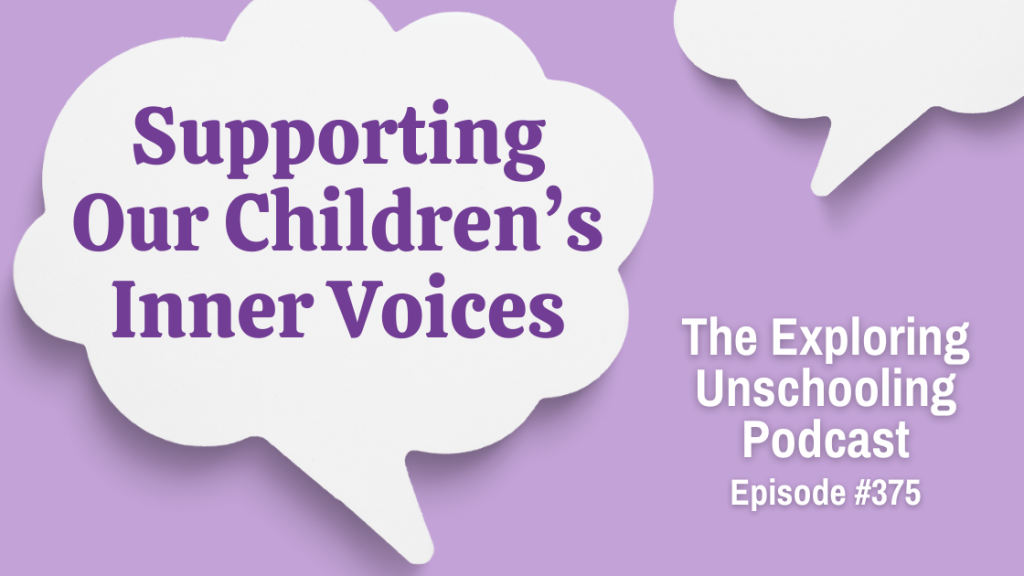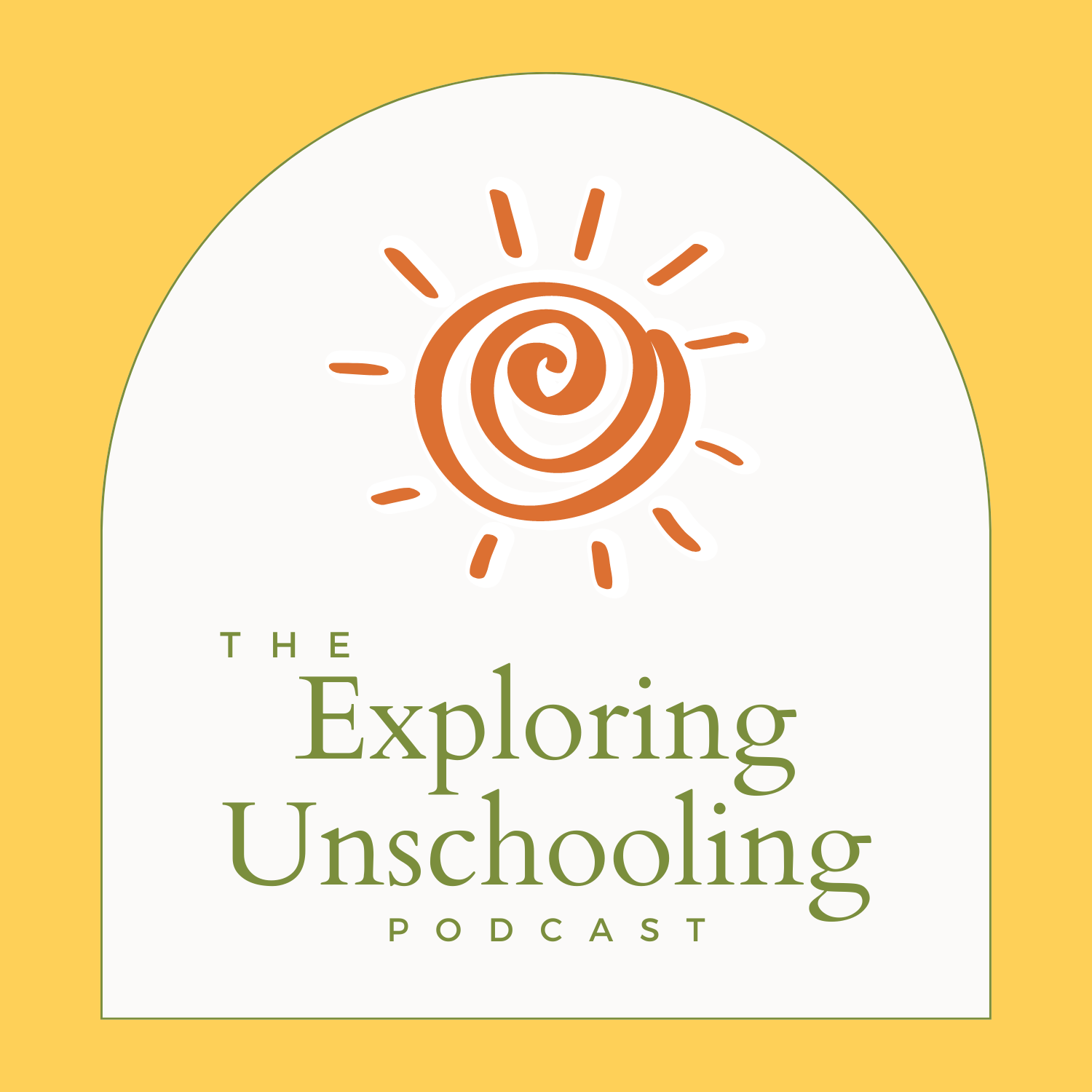EU375: Supporting Our Children’s Inner Voices
Description
 </figure>
</figure>In this episode, Pam, Anna, and Erika dive into supporting our children’s inner voices. External messages and cultural roles can disconnect us from our internal wisdom and knowing. Our unschooling lives give us an opportunity to provide time and space for our children to really tune into their inner voices, and showing them that we are curious about their opinions and letting them know that they know best about themselves can lead to increased self awareness and stronger relationships.
We hope you find our conversation helpful on your unschooling journey and in your relationships!
THINGS WE MENTION IN THIS EPISODE
The Living Joyfully Shop – books, courses, including Four Pillars of Unschooling and Navigating Conflict, coaching calls, and more!
We invite you to join us in The Living Joyfully Network, a wonderful online community for parents to connect and engage in candid conversations about living and learning through the lens of unschooling. This month, we’re talking about seasons—in unschooling and in life. Come and be part of the conversation!
Sign up to our mailing list to receive The Living Joyfully Dispatch, our biweekly email newsletter, and get a free copy of Pam’s intro to unschooling ebook, What is Unschooling?
Watch the video of our conversation on YouTube.
Follow @exploringunschooling on Instagram.
Follow @pamlaricchia on Instagram and Facebook.
Check out our website, livingjoyfully.ca for more information about navigating relationships and exploring unschooling.
So much of what we talk about on this podcast and in the Living Joyfully Network isn’t actually about unschooling. It’s about life. On The Living Joyfully Podcast, Anna Brown and Pam Laricchia talk about life, relationships, and parenting. You can check out the archive here, or find it in your your favorite podcast player.
EPISODE TRANSCRIPT
ANNA: Hello, I’m Anna Brown from Living Joyfully, and today I’m joined by my co-hosts, Pam Larrichia and Erika Ellis.
Before we get started, I wanted to encourage you to check out the shop where you can find books, courses, coaching, and information about the Living Joyfully Network. The shop has resources and support for every stage of your journey. You can find the link in the show notes, or you can visit livingjoyfullyshop.com.
Today we’re going to be talking about allowing space for our children to cultivate their own inner voice. Erika, would you like to get us started?
ERIKA: I would love to. This is fun because I know that I have mentioned my own children’s inner voices many times on the podcast before, and I think cultivating the space for them to tune into those inner voices is one of the most important things that I can do as a parent.
So when we talk about our inner voice or our children’s inner voices, I think it really relates to the idea that people are different, which is something we’re always mentioning. Our thoughts and our feelings, our bodily sensations and so much more, are unique to us individually. And so, the inner voice is messages from our thoughts, our feelings, and our bodies that tell us what feels good to us, what works well for us, what makes sense for us.
It could be described as our intuition or our gut, like the phrase, listen to your gut or our heart, like the phrase, follow your heart. But the key I think, to all of these is that it’s so internal. It’s unique to us as individuals and no one else can know what our inner voice is saying, but us.
And so, if as parents, we’re constantly telling our children what they should feel and think, or implying that there’s a right way to feel and think about things, our children can become disconnected from what they feel and think for themselves. And I think it’s a pretty common experience in school to kind of lose touch with that inner voice because there are just so many external voices telling children what to do and what is best and what is right.
And so, when we’re talking about unschooling, that is one of the really valuable things I think that we can offer our children is that space and time to cultivate that inner knowing and really encourage them to tune into that inner voice, reassure them that everyone’s experience is different and that they’re the ones who truly know themselves deeply.
And I think having someone there who really believes in their ability to make decisions and believes that they can tune into what works for them, is just super empowering for children as they grow and learn. So, I’m excited to talk about this.
PAM: I’m thinking back to when the kids came home from school we were together all the time. When I think about this, the skill I had to learn and really embrace was patience. They left school, so they had that environment. I had relatively recently left work, all those outer voices were strong.
So to have the patience to hold this space for all of us to actually see what bubbles up for us. I mean, it was hard and it was the most amazing and revealing thing. Over time, wow, it’s amazing where we go when we leave space for this. And also it’s amazing the time that it takes.
We were just so used to the busyness and focusing on accomplishing all these things. We want to do this, well, if we want to do this, then we gotta do this, this, this, and this. It’s just so easy to flip into that kind of busyness mode, that accomplishment mode. But to have that patience and hold up that space for everyone, it was life changing.
These are human beings. This is how wonderfully we can move through the world when we have that chance to actually see what bubbles up. Listen to our inner voice, just absorb what’s going on and make that next choice moving forward.
Even when we’re in the flow. To get into the flow of whatever it is that we’re doing in the moment and just to see where it takes us. It was just very beautiful.
ANNA: So many things that I want to say based on what you just said, but I’m going to go in this direction before I lose it, which was, I think a starting point for me was also to learn to listen to my own inner voice. Because I have a belief, I don’t know if it’s true or not true, but I have a belief that our true inner voice doesn’t seek to control others.
And so when I would see myself saying, you should do this, you should do that, that was actually a voice outside of myself that I had incorporated as an inner voice. That was the society or from my family or from people outside of me or from school. I was just this vessel to pass it on to the next generation.
And that’s the piece I wanted to be hyper aware of. And when I really started to tune into what’s my inner voice, what is my priority here? Who do I want to be in the world? You all have heard me say that a million times. Who do I want to be in the world? That really changed because then I could share what worked for me, I could share what was happening for me, but it didn’t have that energy or that judgment of what the other person was doing.
So I felt like by me really becoming clear on what my inner voice was telling me, it allowed the space for those around me to hear theirs. And my children never went to school.
And so what I saw was that they really led the way for me, right? Because I feel like we all come into the world knowing who we are and what we want to do and how we want to move in that moment. There’s lots of growth ahead. Obviously I’m still growing, but I think we really do have a good sense of ourselves when we come in and that kind of gets chipped away at by various environments or whatever we were exposed to.
But I found that they had a strong sense of that. And when I could not be this vessel of society’s ‘have tos’, I learned from them and it just came very naturally.
ERIKA: I love that so much. That’s amazing. I feel like a lot of times we may have something that feels like our inner voice. But once we start peeling back the layers, once we start thinking about where did this belief come from? Do I really believe it? There are a lot of these things that were just super ingrained, since childhood, societal messages and so, starting with yourself and starting with, what is my actual inner voice saying?
It helps me be





